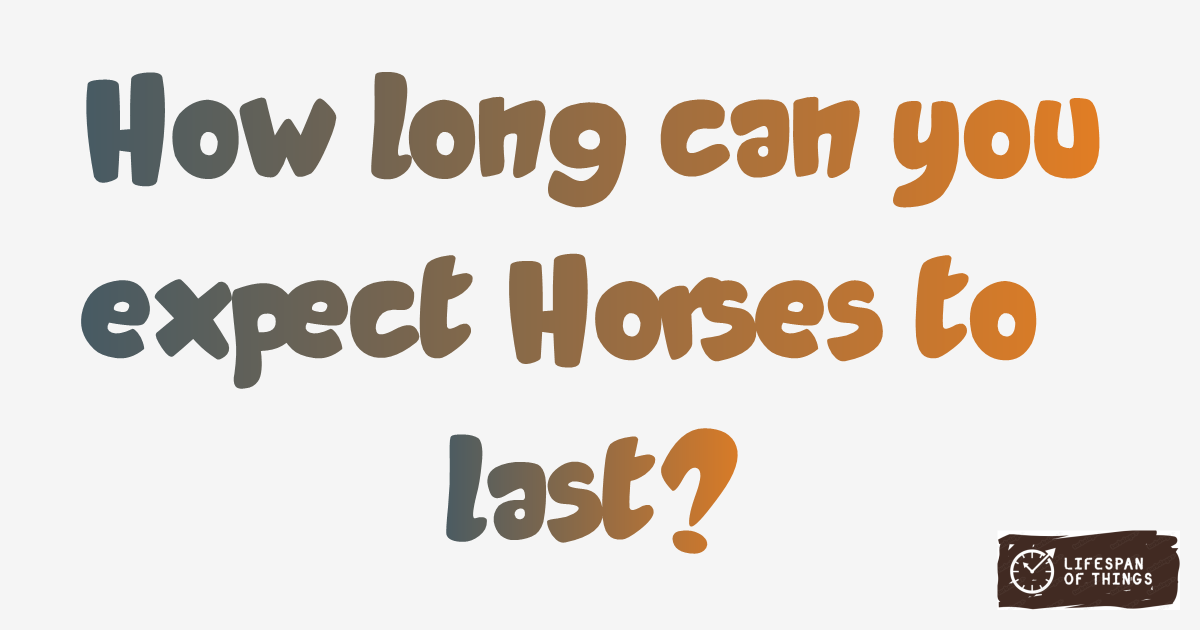
20 - 30 Years
Lifespan of Horses is 20 - 30 Years. Horses live approximately 20-30 years, influenced by factors like care, diet, and exercise. Regular veterinary checkups and a balanced diet are crucial for their well-being. Providing a safe and enriched environment helps them maintain a high quality of life.
Useful Information
Horses typically thrive in spacious pastures or barns with ample room to move and graze. They require shelter from extreme weather conditions and access to fresh water at all times. Green pastures with grass and hay are essential for their diet and overall health.
Horses are herbivores and primarily feed on grass, hay, and grains. A balanced diet rich in fiber, vitamins, and minerals is essential for their nutritional needs. Adjusting feed based on age, weight, and activity level is important to maintain their health.
To care for Horses and improve their lifespan, regular farrier visits for hoof care and dental checkups are necessary. Managing stress, providing ample exercise, and proper grooming routines contribute to their overall well-being. Vaccinations and parasite control help prevent common illnesses.
Horses are social animals that thrive on interaction with humans and other horses. Training them with positive reinforcement and consistent routines can help shape their behavior. Understanding their body language and respecting their boundaries is key to building a strong bond with them.
Discover effective methods for training and shaping the behavior of domesticated animals, promoting obedience and a harmonious relationship. Read more
Horses are not considered endangered, but various breeds may face conservation challenges due to declining populations or genetic issues. Responsible breeding practices, preservation of rare bloodlines, and support for equine rescue organizations contribute to the welfare of Horses.
Lifespan Comparisons
| Compared Item | Comparison Description |
|---|---|
| Lifespan of Cats | Horses typically live almost twice as long as cats, providing long-term companionship and support in a home. |
| Lifespan of Dogs | Compared to dogs, horses have a significantly longer lifespan, making them ideal for enduring bonds and connections. |
| Lifespan of Rabbits | Rabbits have a shorter lifespan compared to horses, but both animals bring joy and comfort to their owners during their time together. |
| Lifespan of Farm Animals | Farm animals like horses have a similar lifespan to dogs, ensuring lasting relationships and stability on farms. |
| Lifespan of Predators | Predators may have a comparable lifespan to horses, but they serve different roles in ecosystems and exhibit diverse behavior patterns. |
| Lifespan of Endangered Species | Endangered species typically live longer than horses, emphasizing the need for conservation efforts and protection of their habitats. |
| Lifespan of Small Mammals | Small mammals have a shorter lifespan than horses, showcasing the delicate balance of nature and the uniqueness of each species. |
| Lifespan of Lion | Lions share a similar lifespan with horses, but they play distinct roles in their respective ecosystems, showing the diversity of wildlife. |
| Lifespan of Dried Herbs | Dried herbs have a significantly shorter lifespan compared to horses, highlighting the different uses and preservation methods for each. |
| Lifespan of Spices | Spices also have a shorter lifespan than horses, underscoring the importance of proper storage and freshness in culinary practices. |
| Lifespan of Sweeteners | Sweeteners like honey or sugar have a shorter lifespan than horses, yet they add sweetness and flavor to various dishes and beverages. |
| Lifespan of Oils and Vinegars | Oils and vinegars have a lifespan shorter than horses, but they provide essential flavors and textures in cooking and food preparations. |
| Lifespan of Running Shoes | Running shoes have a shorter lifespan than horses, emphasizing the importance of regular replacements for comfort and performance. |
| Lifespan of Cleats | Cleats last longer than running shoes but still have a shorter lifespan compared to horses, catering to specific sports and activities. |
| Lifespan of Hiking Boots | Hiking boots have a longer lifespan than running shoes, offering durability and support for outdoor adventures that complement the endurance of horses. |
Frequently Asked Questions
Lifespan of Horses is 20 - 30 Years.
Horses thrive in spacious pastures or barns with shelter, access to fresh water, and green pastures with grass and hay.
A balanced diet rich in fiber, vitamins, and minerals such as grass, hay, and grains is crucial for your Horses' nutritional needs.
Regular farrier visits, dental checkups, stress management, exercise, grooming, vaccinations, and parasite control are essential for Horses' well-being.
Training with positive reinforcement, understanding body language, respecting boundaries, and consistent routines can help you bond with your Horses.
Horses are not considered endangered, but some breeds may face conservation challenges. Responsible breeding and support for equine rescue organizations help preserve their welfare.








